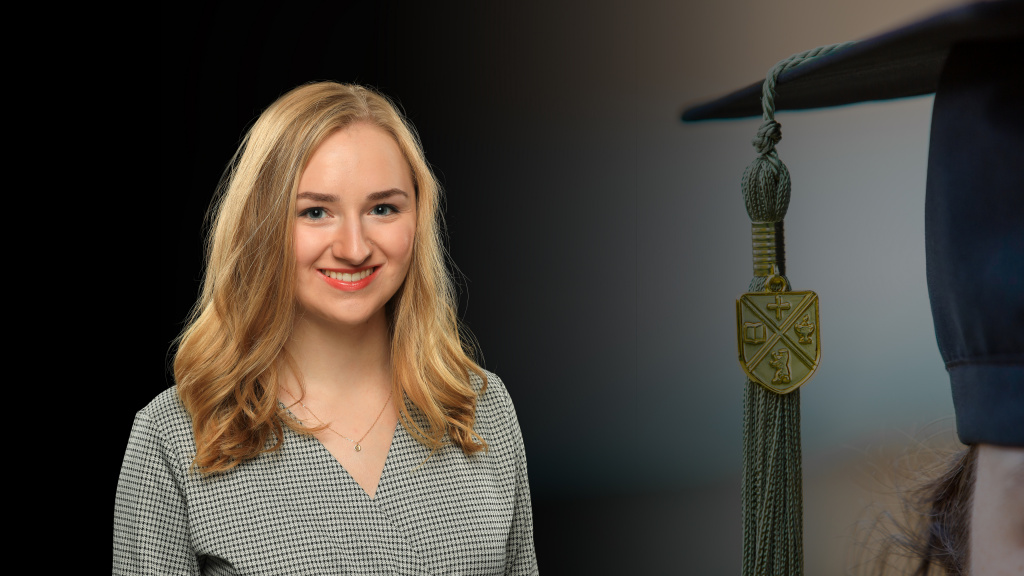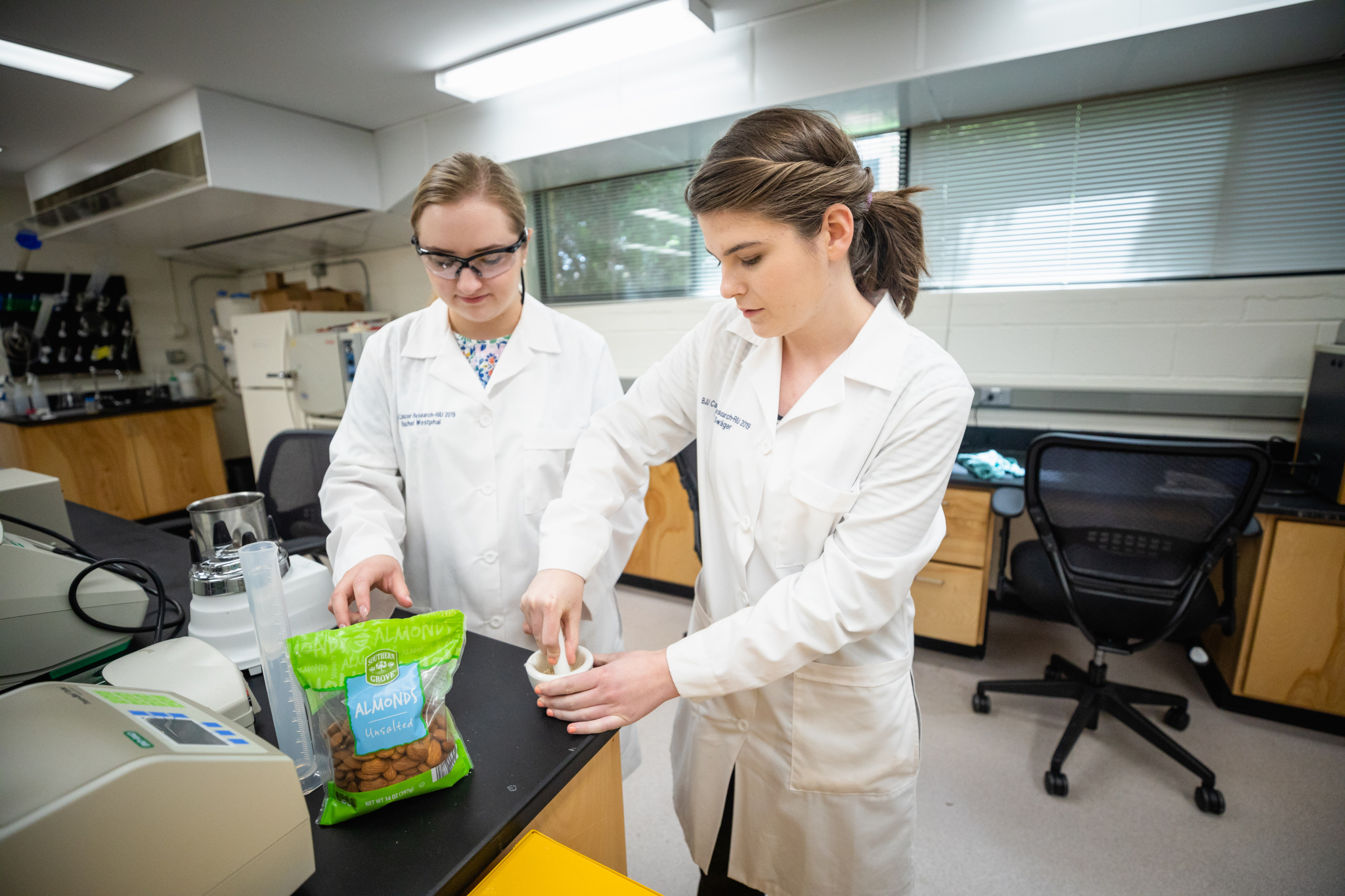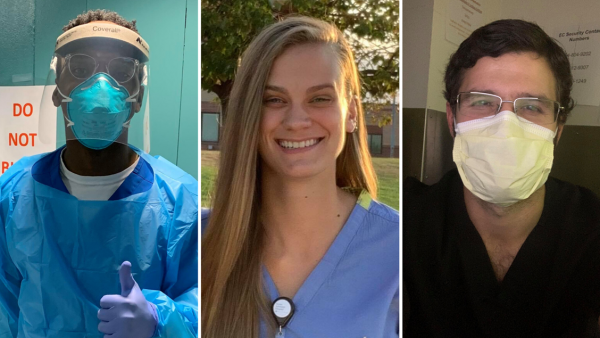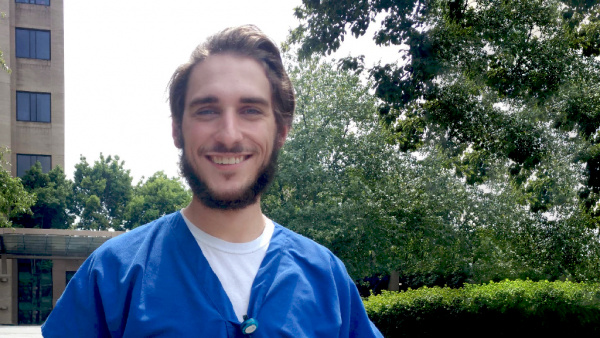“While semester science courses teach you a lot, there is something deeper and more rewarding about focusing on research full time,” said Rachel Westphal, a December 2020 premed graduate. As an aspiring physician and bioethicist, she participated in cancer research as well as a medical mission trip to broaden her classroom experience.
Cancer Research
Prior to the summer of 2019, Westphal began investigating internships and programs to further her education. Having noticed posters in the science building about the Research Immersion for Undergraduates program in BJU’s cancer research lab, she consulted her mom, applied for the program and was accepted. “I was interested in cancer research because I had always been fascinated by the sections of my biology courses where we discussed cancer, particularly its development and progression,” Westphal said.
Working with patients at an infusion center and having family members with cancer also influenced her decision. “Seeing the human side of cancer motivated me to be a part of better understanding this disease,” she said.
During the summer of 2019, Westphal and three other students conducted studies with the goal of proving that treatment with almond extract kills stomach and colon cancer cells. Their research has been submitted to the journal Nutrition and Cancer.
See Also: Summer Research: Programs Benefit Science, Students
Westphal enjoyed many aspects of the research, from daily cell maintenance to experiment planning. “The most exciting part of research is whenever something that hasn’t been working — whether due to the assay or equipment — finally works and you get the data you needed,” she added.
Working with other students also made the research more enjoyable. “I’ve had the privilege of working alongside some really fun coworkers who quickly became friends,” she said. “I think we’ve always been able to strike a balance of doing quality, professional work while maintaining a lighthearted atmosphere.” They even celebrated Half Christmas on June 25 with a whiteboard Christmas tree drawing, Christmas music in the lab, and a white elephant gift exchange.
Round Two of Research
Westphal enjoyed full-time research so much that she returned the next summer to research the type of cell death the almond extract causes. “We found that the type of cell death … is likely apoptosis,” she said. “This is significant because this information could help guide future research regarding what apoptotic pathways are being affected.”
Her experience would not have been the same without faculty leadership. “The BJU faculty has always been one of the best aspects of the university,” Westphal said. “Dr. (Steve) Figard gave us challenges that immensely grew our capabilities in the lab and in thinking as researchers. He also gave us the opportunity to research in the areas in which we’re interested, which is really key to sparking a love for biology research.”
After her two summers of research, Westphal better understands the time and effort science research requires. “Before being a part of cancer research at BJU, I assumed it took a lot of man- hours for a biotech company to create a vaccine,” she said. “But being personally immersed in full-time research for two months and seeing how long it takes to gain one new piece of insight was particularly significant. It also made me incredibly grateful for the scientists of the past who worked so diligently for some of the knowledge and technology we take for granted today.”
She also feels more prepared for her career. “Cancer research gave me first-hand experience in the ways in which new medical knowledge is discovered,” she said. Understanding the time and funding necessary to develop such knowledge or treatments helps explain the often-high cost of medical treatments or pharmaceutical drugs. I also loved cancer research so much I have considered it as a career goal itself.”
Medical Mission Trip
The week before beginning cancer research in 2019, Westphal went on a medical mission trip to Romania. Along with other BJU students, faculty member Dr. Marc Chetta, and additional students and medical professionals, she provided free medical care to the people of Sighetu Marmației and surrounding areas.
Said Westphal: “From what I observed on the trip — this might not hold true for other regions or the country as a whole — Romania’s medical system has a shortage of medical professionals and can be inaccessible. One of the patients told us that surgery waitlists were so long that their best option was to pay extra money for a surgery to be moved up in the queue. I also met a couple who had visited the hospital for tuberculosis but could not afford the necessary prescription medications to treat it.”
Westphal assisted the medical professionals by taking blood pressure measurements, guiding patients between stations and waiting areas, and translating basic German. “It was also a great opportunity to shadow the physicians and nurses with whom I was working,” she added.
As in cancer research, working with a BJU faculty member enhanced the mission trip. “Dr. Chetta was a fantastic physician to shadow as part of the medical mission trip,” Westphal said. “I immensely appreciated the great love of Christ he demonstrated to each of the patients he talked with as well as the opportunities he gave me to interact with patients.”
Loving Every Neighbor
While cancer research helped Westphal understand the process of medicine, the mission trip focused on the purpose of medicine: to help people. “I think this trip really helped me see the way medicine allows medical professionals to directly ‘love their neighbors,’” she said. “The hallmark of good medicine is treating all patients, whether wealthy or from lower-income levels, as equal in worth. … Medical care can help an individual, but … treating people with care can help them as well.”
The discrimination and poverty of Roma, a minority group in Romania, particularly impacted Westphal. “It saddened me to see the poverty as the societal result of racism,” she said. “What I took away most from the trip actually was feeling as though we hadn’t made enough of a difference. I wish that the discrimination would subside, that their prospects as a people group would increase, and that they would have access to adequate medical care and that there would then be no need for a group like ours to come.
“My experience with medical missions exposed me to two contrasting realities — the reality of great inequalities in access to healthcare and the greater, deeper reality of the equality of every human being. This contrast of showing what the world should be like — that it would be just for every individual to have healthcare access — and what the world is — in poverty and with injustices contributing to healthcare disparities — was sobering.”









